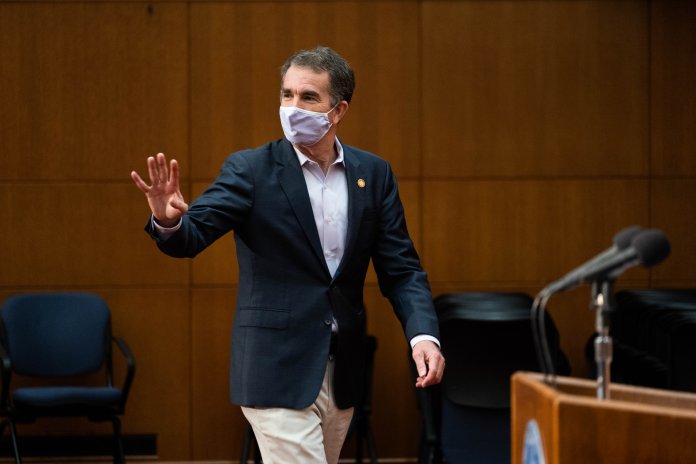The guidelines, announced in a news release on Friday, cap all public and private gatherings, both indoors and outdoors, at 25 attendees — a dramatic reduction from the state’s previous 250-person limit. They also expand the state’s mask mandate, ordering face coverings for all Virginians five and older in indoor public spaces.
The previous order required masks for children starting at age 10. Violations will now be enforceable through the Virginia Department of Health as a Class One misdemeanor, the governor’s office said.
“COVID-19 is surging across the country, and while cases are not rising in Virginia as rapidly as in some other states, I do not intend to wait until they are,” Northam said in a statement. “We are acting now to prevent this health crisis from getting worse.”
Northam’s spokeswoman, Alena Yarmosky, clarified in a later call that the new 25-person restriction will not limit capacity at restaurants — which are required under the state’s Phase Three business guidelines to separate tables by at least six feet — private offices, gyms, or other retail businesses. Schools and churches will also not have to reduce attendance.
“If I’m a restaurant owner, the only impact this is going to have on me is that I can’t rent my business out to groups of 25 people,” she added. “So, I couldn’t rent out my space for a wedding reception. That would qualify as a gathering and they would have to limit that to 25 people or less.”
Restaurants will also not be permitted to seat tables with more than 25 people, and businesses will not be allowed to conduct events such a conferences or auctions with more than 25 people within a single confined space.
The announcement comes just a few days after Northam’s latest in-person news briefing, when he urged Virginians to take steps to limit the spread of the virus by wearing masks, washing their hands, and limiting group interactions, but stopped short of announcing new statewide restrictions.
At the time, he called the state’s numbers “very concerning,” but also pointed out that the state’s percentage of tests returning positive — 6.2 percent at the time — was far lower than it had been in April, when percent positivity rose above 20 percent.
“We have to look at — when you talk about mitigation, really how do we change people’s behavior?” he said during the briefing. “That’s really the challenge. How do we encourage someone when they get up in the morning and go outside the mask to put a mask on? It starts with leadership, and I’m going to do everything I can to continue to get that message out there.”
As of Friday, Virginia’s positivity rate for COVID-19 tests had increased to 6.5 percent — more than a percentage point increase since early October.
Northam’s release also pointed out that the state was averaging 1,500 new cases a day with 35 percent increase in COVID-19 hospitalizations over the last month.
“This is putting a strain on our medical facilities and our frontline workers,” he added in a video message. “And it’s raising the danger level for every Virginian.”
In addition to stricter limits on gathering sizes and an expansion of the state’s mask mandate, the governor announced that the Virginia Department of Health will begin stricter enforcement of statewide guidelines at essential retailers including grocery stores and pharmacies — businesses that weren’t previously being inspected, according to Yarmosky.
“While certain essential retail businesses have been required to adhere to these regulations as a best practice, violations will now be enforceable through the Virginia Department of Health as a Class One misdemeanor,” the release states.
Northam also imposed a 10 p.m. curfew on alcohol sales and consumption at all food and dining establishments, including restaurants, distilleries and wineries. Food and beverage establishments will be required to close by midnight.
All new restrictions will begin at midnight on Sunday.
Northam’s guidelines largely mirror similar restrictions announced in neighboring states earlier this week. On Tuesday, Maryland Gov. Larry Hogan announced he was reenacting stricter capacity limits on indoor dining establishments, advising residents to cap gatherings at 25 people and limit travel to states with high rates of infection. North Carolina Gov. Roy Cooper lowered his state’s limit on indoor gatherings to 10 people.
D.C. Mayor Muriel Bowser kept her current health guidelines intact, but ordered most travelers to get tested for COVID-19 before visiting the city.
Yarmosky said Friday that the governor did not speak with Hogan or Bowser before implementing the state’s new restrictions, which he introduced after conversations with state and local health officials.
“He’s been having active conversations with health officials and considering a wide range of options,” she added. Northam previously announced a public health communications campaign in Southwest Virginia, a region that’s driving much of the state’s case growth. He also announced Tuesday that the state was contracting with three new laboratories to boost its COVID-19 testing capacity.
“[Those] were first steps, but he’s always said there could be more to come,” Yarmosky added.
The announcement was met with criticism from many of Northam’s political opponents, including House Minority Leader Todd Gilbert, R-Shenandoah, who described the new restrictions as “drastic and confusing.”
Former House Speaker Kirk Cox, who’s indicated he may be considering a run for Virginia governor in 2021, wrote on Twitter that the governor seemed to be “looking to dictate how many people you can have in your own house for Thanksgiving.” The move was also opposed by Virginia’s chapter of the National Federation of Independent Business, a special interest group for small business owners.
“We worry that this late announcement on a Friday afternoon puts many small businesses in a difficult position to not only understand the new restrictions, but prepare and comply by midnight Sunday,” director Nicole Riley said in a statement on Friday. “It will be devastating to hard-hit restaurants and event venues that are already struggling to stay afloat.”



